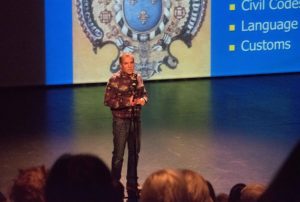Public eager to learn about Truth and Reconciliation teachings

By Kelly Anne Smith
NORTH BAY—Indigenous cultural trainer George Couchie says you can’t change what you don’t understand. Working to uplift Indigenous Peoples from an unjust past, Couchie has brought the history of Canada to North Bay.
Couchie is providing public education in the spirit of the Truth and Reconciliation Commission (TRC) throughout the month of February. The TRC recommended 94 calls to action to correct the relationship between Indigenous and non-Indigenous Canadians.
The series of four Truth and Reconciliation sessions have gained traction as they progress. The second session of Kina maawi gdoo-wiikendaasmin – We Are Learning Together attracted an even larger gathering of approximately 190 people at Widdifield Secondary School, whereas the first event on Indigenous Worldview and Culture yielded approximately 140 participants.
North Bay Mayor Al McDonald listened intently about the area’s history which was never included in public education for Canadians. Nipissing First Nation Chief McLeod explained that his red hair and last name come from a Scottish ancestor in the fur trade. His mother is Mi’kmaq and his father is from Nipissing First Nation.
First Nations people have been filling the seats as well. They too want to learn their own history.
Susan from Henvey Inlet First Nation appreciates the Truth and Reconciliation efforts of George Couchie.
“It means a lot to me, about what he was saying about losing status and the card for marrying outside the community,” stated Susan. “That happened to my mother.”
Susan shared that she was never taught anything about her culture, though she understands the Ojibway language. She didn’t know the family’s history until recently as her mother never spoke about it. She is proud that her daughter Brenda is learning all about it now.
As a student of the Indigenous Wellness and Addictions Prevention program at Canadore College, she is learning both cultural and mainstream approaches to addictions counselling. As an example, one course explores using traditional methods of healing to break cycles of abuse.
Stacy McQuabbie from Henvey Inlet has worked on her family tree all the way back to 1706; her cousin Brenda Roberts has a copy. She has roots both at Henvey Inlet and Nipissing First Nation.
“I knew there was always something missing,” shared Roberts. “I was always on the rez in the summer to visit my friends and family. But because she married my Dad, she lost her status.”
Brenda is learning Anishinaabemowin from Blair Beaucage. She has had teaching from June Commanda as well. Brenda finds it fulfilling to work on her traditional language.
“The awakenings and the healings are happening for me,” expressed Roberts. “Everything is starting to come together. A great piece is inside my heart and I feel it rippling out into my family and making change.”
Susan breaks in.
“I had never even went to a pow wow before,” stated Susan. “I finally did a few years ago.”
“That was in 2013 when you met your nephew for the first time, Russell Nogonash,” added Brenda.
Turning to me, Brenda explains her first cousin was a Sixties Scoop baby.
“He had been taken away and Mom had never met him,” she recalled. “I was with him and hugging him today, dropping him off with Mom to visit.”
Brenda explained that her grandmother lost her status for falling in love with a white man.
“She was kicked from the reserve there because of the Indian Act,” noted Roberts.
Couchie explained that First Nations occupied Canada since time immemorial and how we are all Treaty People. There is archeological data proving the Nipissing First Nation has been an organized community for at least 10,000 years.
Couchie showed clips from the CBC series A Peoples History.
There were audible gasps from the audience as they learned that pieces of blankets were intentionally infected with smallpox and sent to First Nations. A woman seated beside me whispered “Shame, shame.” We heard that there was a 95% mortality rate from the epidemic.
Couchie also pointed out that many people in the North Bay area were Cree First Nation Members, locating here for education and health services.
“The Cree are the best hunters,” stated Couchie.
Sister Priscilla Soloman was interested to hear the community’s relationship with the Cree.
“I appreciate the way in which George presented the history,” stated Sister Solomon. “Part of it is difficult to hear. Part of it is encouraging for people to hear.”
Soloman’s father is from Henvey Inlet First Nation. Her mother is originally from Wikwemikong First Nation and the Sagamok Anishnawbek First Nation.
Soloman was glad to hear Chief McLeod speak on the history of the Indigenous people of Lake Nipissing and the settler population.
“Unless we come to some kind of understanding of what brought us to this point, then it will be difficult for us to move forward with reconciliation,” stated Chief McLeod. “We need to hear this truth, be open to it and be ready.”
At the end of the evening Mindie Laviere-Martel and Melanie Beaucage sang a Grandmother song and then a traveling song to send us on our own healing journey.


